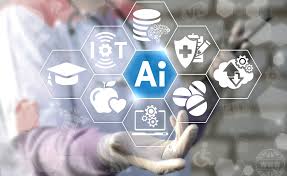Source: forbes.com
The impact of automation in the workforce extends far beyond any individual employee, organization or even industry. As artificial intelligence advances and companies adopt this technology, we’re beginning to see an economic shift.
In 2017, JPMorgan estimated that automation has the potential to increase global gross domestic product by more than $1.1 trillion over the next 10 years. Meanwhile, according to Bloomberg (paywall), PwC predicted that AI could add up to $15.7 trillion to the worldwide economy by 2030. While there’s a huge discrepancy between these projections, I believe the underlying message is clear: Automation is a major factor in the future of global economic growth.
And yet, some experts are anticipating an “AI winter,” a period when investments and developments in AI begin to slow down or stall. Although I’ve observed some success in funding AI in various ways — such as coding boot camps and computer science degrees in an effort to close the skills gap — we haven’t seen the complete payoff we’ve expected. AI still has biasproblems; deep learning still gets stumped by simple, if unexpected, variables; neural networks are far from the point where they can be consistently leveraged strategically for business.
As a serial AI entrepreneur, I’ve made it my goal to dedicate enormous resources to research and development for machine learning and AI, and I’ve been able to build tech companies that do the same. Although some do not agree we are approaching an AI winter, from my perspective, as the economy comes to increasingly rely on more sophisticated machines, we can confront a potential plateau of AI development by training machines as an industry and providing more education to those creating the technology.
Education Reform For AI
In my experience, most of today’s AI developers are constrained by the mandate to automate. As a result, machines can become products of what I call “teaching to the test.” They can do singular tasks incredibly well, given incredibly narrow conditions.
When AI has to go off-script, so to speak, it struggles. For example, tech company DeepMind was working to develop AI that would function as a world-class Breakout player. But according to Wired, what they found in this initial brush with gaming AI was that the “seemingly supersmart AI could play only the exact style of Breakout it had spent hundreds of games mastering.” Even the smallest change to the game mechanics or layout caused the whole thing to break.
My point is that the majority of AI today doesn’t have critical thinking skills or common sense. Instead, it’s been designed to succeed through sheer rote memorization. It’s processing information to give an answer or action, but it’s not actually understanding what’s happening.
To address this, I believe tech companies need a playbook for research and development to prepare themselves for the next wave of innovation. And although there’s no canonical curriculum for training AI, there are a few key steps executives can take to ensure they are investing in AI education the right way:
Hire strategically.
Perhaps most importantly, it’s crucial that organizations hire the right people. Staffing for AI isn’t easy. Ensuring your recruits have the right technical chops can be expensive, but it’s worth it. Look for employees who have a history of dedicated curiosity. Have they published research? Are they interested in continued education? I believe AI developers who are equal parts programmers and researchers are the most valuable asset a tech company can have. Organizations that can recruit and keep this talent will find that they are suddenly the owners of valuable IP because their new AI hires are able to devote themselves to experiments and training the tech, rather than learning the skills for the job.
Enable your entire team to become more AI-literate.
Of course, as organizations seek to hire for positions that will become the bedrock of their tech strategy, I suggest that executives consider investing other company resources in support. Make your organization more competitive in its hiring by acquiring or collecting diverse and interesting data sets. There’s so much data out there, and extracting some of that data can help you determine what’s possible. For example, you might pull data from hundreds of automated bots and then synch them to create immediate, actionable insights. This means that you might have to spend more time at the collection phase, and your data sets might have to be larger as you conduct additional research to fill in any holes.
Additionally, incorporate AI training into your company’s professional development cross-departments. I believe the workforce of the future depends upon AI leadership and literacy. It’s predicated on the idea that everyone can contribute to AI’s teachings. This doesn’t mean teaching everyone in your organization to code. In fact, quite the opposite. Keep your lessons high-level and even philosophical. You’ll know you’ve succeeded if everyone in your organization can explain how AI gets trained, how it could be applied to a situation and — this is just as important — why it might fail.
The Future Of Company Success
Already, I’ve seen some companies commit the necessary resources for research and development projects in an effort to train AI to think about the challenges it’s presented with. Other companies considering doing the same should earmark resources purely for research and development in AI without the end goal being a breakthrough in automation. Make it clear that the underlying mission of your research teams is to push the bounds of your technical understanding — not push out a product.
This shake-up in educating AI will unlock solutions we never dreamed possible. After all, the real value in AI comes from the bigger, new ways of thinking that it illuminates for us — the new patterns and wild ideas that only a machine, powered by tons of data and a healthy dose of common sense, could come up with.
